This stunning garden beauty releases deadly toxins while perfuming your evening air.
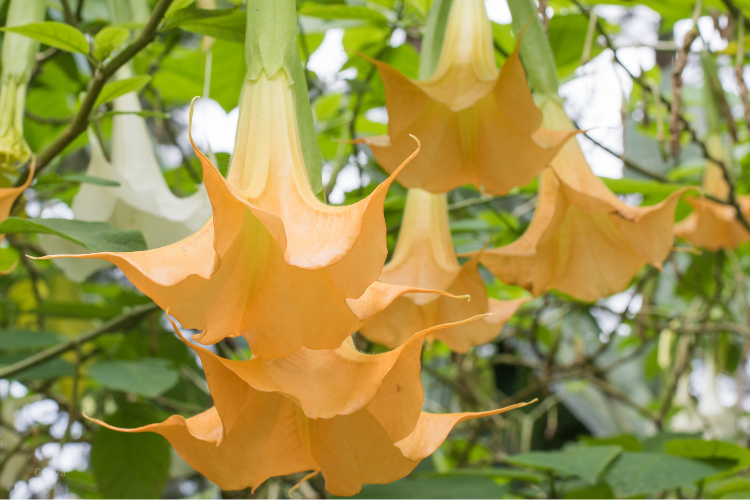
Walking through a moonlit garden, you catch a whiff of the most intoxicating fragrance imaginable. The scent draws you closer to massive, trumpet-shaped blooms hanging like elegant chandeliers from a towering shrub. Their creamy petals seem to glow in the darkness.
But this botanical seductress harbors a lethal secret. Angel’s Trumpet, scientifically known as Brugmansia, produces some of nature’s most potent neurotoxins while simultaneously creating one of the plant kingdom’s most alluring perfumes.
1. Nightfall triggers the flower’s most dangerous charm offensive.
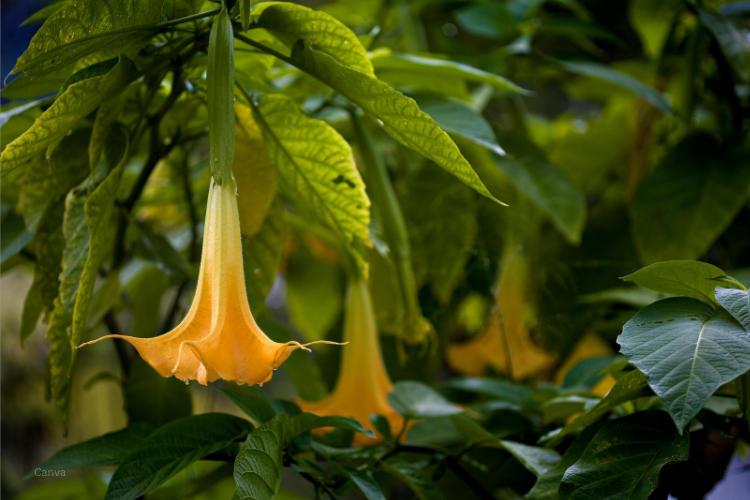
Evolution crafted Angel’s Trumpet as the ultimate nocturnal predator, though its prey are moths rather than humans. As darkness falls, the plant begins pumping out clouds of sweet, jasmine-like fragrance that can perfume an entire neighborhood. According to the American Journal of Emergency Medicine, this timing coincides perfectly with when curious gardeners and thrill-seekers are most likely to encounter the blooms during evening strolls.
Meanwhile, those same trumpet-shaped flowers are manufacturing a cocktail of alkaloids so potent that indigenous peoples once used them in sacred rituals. The plant doesn’t discriminate in its toxin production, loading every petal, leaf, and stem with compounds that can scramble human brain chemistry within minutes of ingestion.
2. Three notorious chemicals turn beauty into beast mode.
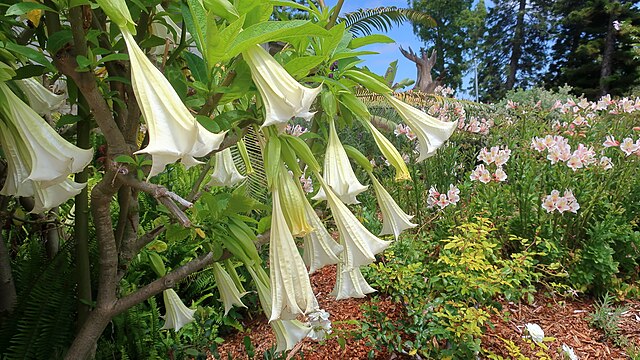
Each gorgeous bloom contains a trinity of tropane alkaloids that read like a pharmacological nightmare. Scopolamine, the most infamous member of this toxic trio, earned its street name “devil’s breath” for good reason. Atropine follows close behind, capable of sending heart rates soaring while pupils dilate to black saucers, as reported by the Journal of Medical Toxicology.
Hyoscyamine rounds out this chemical triumvirate, working synergistically with its molecular cousins to create a perfect storm of neurological chaos. Together, these compounds can induce complete memory loss, vivid hallucinations, and total loss of free will. The plant essentially transforms willing victims into biological zombies, compliant to outside suggestions while remaining conscious.
3. Hospital emergency rooms know this flower by name.

Poison control centers across the United States log dozens of Angel’s Trumpet cases annually, with symptoms ranging from mild confusion to life-threatening coma. Dr. Susan Smolinske of the New Mexico Poison Center documented numerous cases where victims required mechanical ventilation after brewing tea from the attractive flowers. The plant’s reputation has spread through both medical literature and underground drug culture.
Emergency physicians have learned to recognize the telltale signs immediately. Patients arrive with massive pupils, incoherent speech, and bizarre behavior that can persist for days. The unlucky ones never make it to the hospital at all, succumbing to respiratory failure or cardiac arrest in their own gardens.
4. Criminal enterprises exploit the flower’s mind-control properties.

Drug cartels and street criminals discovered what shamans knew centuries ago. Scopolamine extracted from Angel’s Trumpet creates the perfect compliance drug, rendering victims utterly helpless while appearing relatively normal to casual observers. Criminals blow the powdered extract into faces or slip it into drinks at bars and clubs.
Victims become walking ATM machines, willingly handing over PIN numbers, emptying bank accounts, and even helping load their own possessions into thieves’ vehicles. The complete amnesia that follows means most crimes go unreported because victims remember nothing. Law enforcement agencies worldwide now track this botanical weapon as it spreads through urban criminal networks.
5. Gardeners accidentally dose themselves through simple contact.
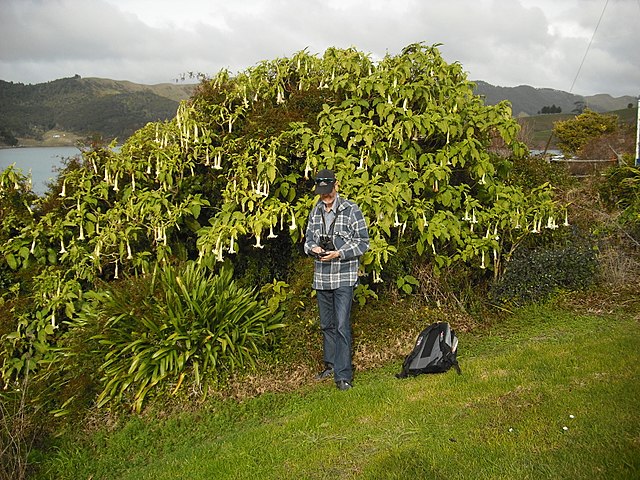
Pruning Angel’s Trumpet without gloves can deliver enough alkaloids through skin absorption to cause mild poisoning. Garden centers sell these plants alongside roses and petunias, often without adequate warning labels about their deadly nature. Homeowners plant them for their spectacular blooms and intoxicating evening fragrance, completely unaware of the risks.
Children face particular danger because the large, colorful flowers naturally attract young explorers. Even small amounts of plant material can prove fatal to curious toddlers who sample garden treats. Pet owners report similar tragedies when dogs or cats chew on fallen trumpet flowers during evening walks.
6. Traditional cultures weaponized these blooms for centuries.

South American shamans incorporated Angel’s Trumpet into elaborate spiritual ceremonies, using carefully controlled doses to induce prophetic visions and communicate with ancestral spirits. Warriors would consume tiny amounts before battle, believing the plant granted supernatural courage and immunity to enemy weapons. The line between spiritual enlightenment and permanent brain damage remained razor-thin.
Colombian tribes developed sophisticated preparation methods, aging and fermenting the flowers to concentrate specific alkaloids while reducing others. These ancient techniques required generations of knowledge to master safely. Even experienced shamans occasionally miscalculated dosages, leading to permanent madness or death among ceremony participants.
7. Modern chemistry reveals why the plant packs such devastating punch.

Scientists now understand that Angel’s Trumpet alkaloids perfectly mimic human neurotransmitters, essentially hijacking the brain’s communication system. The molecules lock onto acetylcholine receptors like counterfeit keys, preventing normal nerve signal transmission throughout the central nervous system. This molecular mimicry explains why victims lose control over basic functions like breathing and heart rhythm.
Research laboratories studying these compounds for potential medical applications must follow strict safety protocols. Even trained chemists working with purified extracts risk accidental exposure through inhalation or skin contact. The plant’s evolutionary strategy proves so effective that pharmaceutical companies now synthesize similar compounds for surgical anesthesia, though in carefully controlled microscopic doses.
8. Beautiful gardens hide deadly neighbors in plain sight.
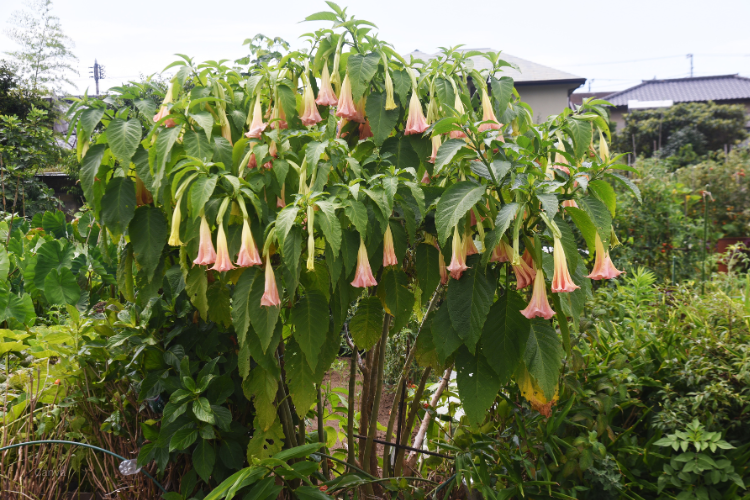
Angel’s Trumpet thrives in temperate climates worldwide, flourishing in ordinary suburban gardens alongside harmless flowers. The plants grow rapidly into impressive specimens, some reaching fifteen feet tall with hundreds of pendant blooms. Their maintenance requirements mirror those of common ornamental shrubs, making them appealing to amateur gardeners seeking dramatic landscape features.
Botanical gardens often display these specimens with discrete warning signs, but private gardens rarely include such precautions. The disconnect between the plant’s stunning appearance and lethal nature creates a perfect trap for unsuspecting admirers. One evening’s innocent garden party can transform into a medical emergency when guests decide to sample the fragrant, trumpet-shaped temptations hanging at eye level.
